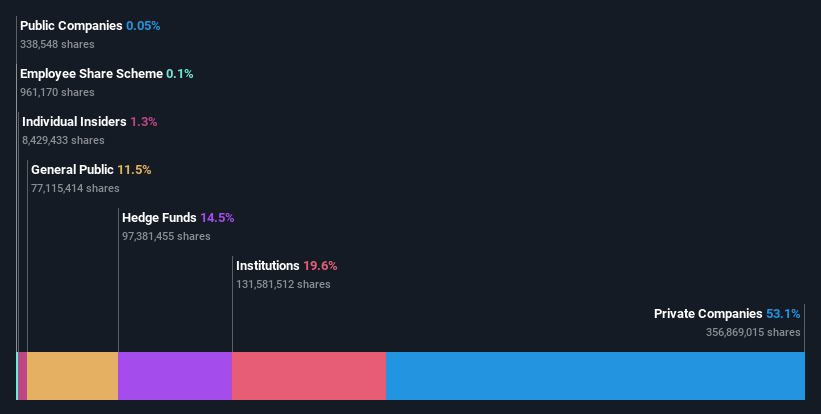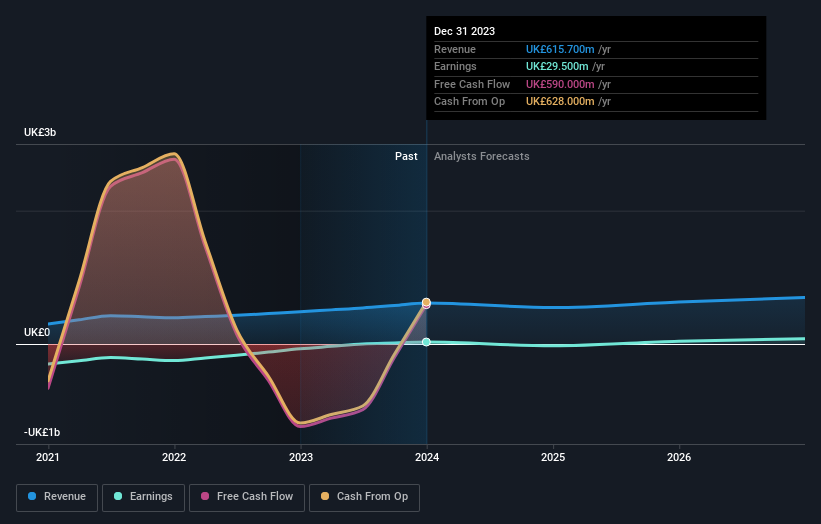Private companies account for 53% of Metro Bank Holdings PLC's (LON:MTRO) ownership, while institutions account for 20%
Key Insights
The considerable ownership by private companies in Metro Bank Holdings indicates that they collectively have a greater say in management and business strategy
53% of the company is held by a single shareholder (Spaldy Investments Limited)
Every investor in Metro Bank Holdings PLC (LON:MTRO) should be aware of the most powerful shareholder groups. We can see that private companies own the lion's share in the company with 53% ownership. That is, the group stands to benefit the most if the stock rises (or lose the most if there is a downturn).
And institutions on the other hand have a 20% ownership in the company. Insiders often own a large chunk of younger, smaller, companies while huge companies tend to have institutions as shareholders.
Let's delve deeper into each type of owner of Metro Bank Holdings, beginning with the chart below.
View our latest analysis for Metro Bank Holdings
What Does The Institutional Ownership Tell Us About Metro Bank Holdings?
Institutions typically measure themselves against a benchmark when reporting to their own investors, so they often become more enthusiastic about a stock once it's included in a major index. We would expect most companies to have some institutions on the register, especially if they are growing.
As you can see, institutional investors have a fair amount of stake in Metro Bank Holdings. This can indicate that the company has a certain degree of credibility in the investment community. However, it is best to be wary of relying on the supposed validation that comes with institutional investors. They too, get it wrong sometimes. It is not uncommon to see a big share price drop if two large institutional investors try to sell out of a stock at the same time. So it is worth checking the past earnings trajectory of Metro Bank Holdings, (below). Of course, keep in mind that there are other factors to consider, too.
It looks like hedge funds own 14% of Metro Bank Holdings shares. That's interesting, because hedge funds can be quite active and activist. Many look for medium term catalysts that will drive the share price higher. Spaldy Investments Limited is currently the largest shareholder, with 53% of shares outstanding. With such a huge stake in the ownership, we infer that they have significant control of the future of the company. With 8.7% and 5.7% of the shares outstanding respectively, Spruce House Investment Management LLC and Conifer Management, LLC are the second and third largest shareholders. In addition, we found that Daniel Frumkin, the CEO has 1.2% of the shares allocated to their name.
Researching institutional ownership is a good way to gauge and filter a stock's expected performance. The same can be achieved by studying analyst sentiments. Quite a few analysts cover the stock, so you could look into forecast growth quite easily.
Insider Ownership Of Metro Bank Holdings
While the precise definition of an insider can be subjective, almost everyone considers board members to be insiders. Management ultimately answers to the board. However, it is not uncommon for managers to be executive board members, especially if they are a founder or the CEO.
I generally consider insider ownership to be a good thing. However, on some occasions it makes it more difficult for other shareholders to hold the board accountable for decisions.
Shareholders would probably be interested to learn that insiders own shares in Metro Bank Holdings PLC. In their own names, insiders own UK£2.8m worth of stock in the UK£222m company. This shows at least some alignment. You can click here to see if those insiders have been buying or selling.
General Public Ownership
With a 11% ownership, the general public, mostly comprising of individual investors, have some degree of sway over Metro Bank Holdings. While this group can't necessarily call the shots, it can certainly have a real influence on how the company is run.
Private Company Ownership
We can see that Private Companies own 53%, of the shares on issue. It might be worth looking deeper into this. If related parties, such as insiders, have an interest in one of these private companies, that should be disclosed in the annual report. Private companies may also have a strategic interest in the company.
Next Steps:
I find it very interesting to look at who exactly owns a company. But to truly gain insight, we need to consider other information, too. Be aware that Metro Bank Holdings is showing 2 warning signs in our investment analysis , and 1 of those is significant...
Ultimately the future is most important. You can access this free report on analyst forecasts for the company.
NB: Figures in this article are calculated using data from the last twelve months, which refer to the 12-month period ending on the last date of the month the financial statement is dated. This may not be consistent with full year annual report figures.
Have feedback on this article? Concerned about the content? Get in touch with us directly. Alternatively, email editorial-team (at) simplywallst.com.
This article by Simply Wall St is general in nature. We provide commentary based on historical data and analyst forecasts only using an unbiased methodology and our articles are not intended to be financial advice. It does not constitute a recommendation to buy or sell any stock, and does not take account of your objectives, or your financial situation. We aim to bring you long-term focused analysis driven by fundamental data. Note that our analysis may not factor in the latest price-sensitive company announcements or qualitative material. Simply Wall St has no position in any stocks mentioned.

 Yahoo Finance
Yahoo Finance 

